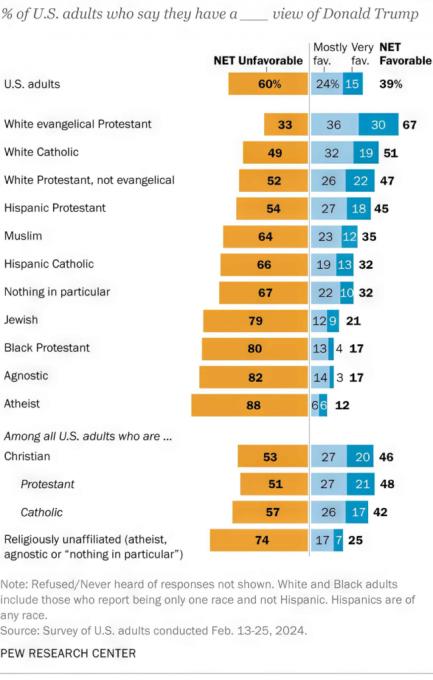A Pew Research Center survey conducted from February 13-25, 2024, explored the link between Religious identity and political preference, focusing on support for former President Trump. The study aimed to understand how faith influences political alignment in the US.
You can also read: Trump’s Prospects to Come Back in 2024 Election
In a separate survey, 80% said religion’s role in public life is shrinking, with 49% viewing this as a bad thing – the highest in two decades. The findings of these two reports can shed a crucial relationship between the Upcoming US elections and ‘religious voting base’.
Main Findings
- White Evangelical Support
The Pew survey shows stark differences in Trump support across religious groups. White evangelical Protestants stand out, with two-thirds favoring Trump, while about half of White Catholics and non-evangelical Protestants view him positively.
- Impact of Church Attendance
Surprisingly, church attendance doesn’t greatly influence Christians’ perceptions of Trump. Around 47% favor him regardless of attendance frequency, suggesting personal religious practices don’t heavily sway political leanings.
- Religious Commitment
The survey categorizes Trump supporters by religious commitment. Only 23% are highly religious, with most being moderately religious. Strong religious fervor isn’t a prerequisite for supporting Trump.
- Diverse Views Among Other Groups
Atheists, agnostics, Black Protestants, and Jewish Americans show strong unfavorable stances toward Trump, with most holding negative views.
Religious Identity and Political Views
The survey digs into how religious identity influences political views, and it uncovers some pretty interesting trends among people who don’t have a religious affiliation, often called “nones.” Within this group, those who identify as cultural Christians tend to have a more positive view of Trump, hinting at a subtle connection between cultural identity and political leanings.
On the flip side, religious nones who don’t see themselves as culturally Christian mostly disapprove of Trump. This split highlights the complex interplay between religious identity and political preferences. It suggests that cultural factors can shape political views just as much as formal religious practices do.
Perceptions of Trump’s Religiosity
It’s quite fascinating that only a handful of people, even among his own supporters, see Donald Trump as a deeply religious person. In fact, a tiny 8% of his supporters actually view him as highly faithful. But here’s the intriguing part: despite this perception, half of them still believe that he stands up for their religious beliefs. And this sentiment is even stronger among White evangelical Protestants.
Roughly two-thirds of White evangelical Protestants feel that Trump really goes to bat for their religious causes. This perception plays a huge role in why they continue to support him. It underscores a key point: for many folks, a political leader’s willingness to advocate for religious values matters more than how personally pious they are.
The Paradox of Trump’s Image: Not Religious, Yet a Defender of Beliefs
Donald Trump is a bit of an enigma when it comes to religion and politics. Most people, even his own supporters, don’t see him as a particularly devout or pious man. Yet, many still view him as a strong defender of their religious beliefs. It’s an interesting contradiction that highlights how personal religiosity might not be as important as the perception of advocating for religious causes.
A good chunk of Trump’s supporters, especially among White evangelical Protestants, genuinely believe that he’s out there fighting for their religious values. This perception is really powerful and seems to matter more than whether Trump himself is a regular churchgoer or not. About half of those who like Trump say he stands up for people with similar religious beliefs to a considerable degree, and nearly a quarter feel he does this to a great extent.
This whole phenomenon points to a larger trend in political loyalty. It suggests that symbolic actions and policy stances might strike a stronger chord with voters than a candidate’s personal religious practices.
Analysis of two Surveys
As previously mentioned, in a separate study, 80% of U.S. adults said that they believed religion’s role in American life was shrinking. Overall, 49% of U.S. adults say both that religion is losing influence and that this is a bad thing. A combined 57% of U.S. adults – a clear majority – express a positive view of religion’s influence on American life.
The fact that nearly half the respondents believed that the loss of religion’s loss of importance is bad, is significant, as many Americans might view Trump as a ‘defender’ of religious beliefs. This is likely to rally many of Americans to Trump as they will likely consider him to fight for their beliefs.
Conclusion
The Pew Research findings shed light on the complicated ways that faith and politics intersect in the U.S. Support for Trump varies a lot across different religious groups, reflecting the diverse values and political priorities people have.
What’s particularly interesting is that personal religiosity seems to play a smaller role compared to the perception that a candidate advocates for religious beliefs. This study shows that political identity can be deeply intertwined with religious and cultural identities, influencing the way people vote in complex ways. These insights are super important for understanding the ever-changing landscape of how Americans align themselves politically and religiously.
The post Faith, Politics, and Trump: A Complex Trinity appeared first on Press Xpress.

